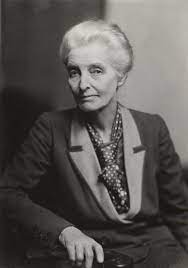Webb, Beatrice

Bio: (1858-1943) British sociologist. Beatrice Webb came from a wealthy family but had no formal academic education. At the beginning of her career, she was engaged in a humanitarian organization where she worked in social work with the poor. She later became one of the associates of Charles Booth, who conducted extensive research on the lives and work of poor workers in London. During this research, she conducted secret participatory observation research, working as a seamstress in an illegal textile factory.
Webb did a similar field research for cooperatives, and the product of that research was her first book, Cooperative Movement in Great Britain (1891). Her research on cooperatives led to her collaboration with the Fabian Society, an organization that researched and campaigned for socialist reforms of the British economy. Webb met her husband Sidney Webb at the Fabian Society, and the two of them conducted research together and wrote several books. The first book they published together was History of Trade Unionism (1894). Both of them played a key role in the founding of the London School of Economics in 1895. Beatrice and Sydney Webb participated in the work of the Commission that researched the scope and success of “Poor Laws” (Poor Laws are a series of laws passed in the nineteenth century that regulated socio-economic measures to help the poor in Britain). They concluded that these laws are inadequate and should be repealed, and the results of this research were presented in the books The Break-Up of the Poor Law (1909), English Poor-Law Policy (1910), and The Abolition of the Poor Law (1918). They advocated the introduction of a minimum wage and the creation of a comprehensive system of free health insurance.
After visiting the Soviet Union in the early 1930s, Sydney and Beatrice Webb wrote the book Soviet Communism: A New Civilization? (1935), in which they expressed their enthusiasm for Soviet communism and presented it as the best alternative to capitalism. Beatrice Webb is also notable for her contribution to the sociological method because, in addition to conducting participatory observations, she also wrote about the caution that every sociologist must have when researching an area or topic because each person brings with him or her burden of previous experience and of his or hers social and economic background. The researcher can remove this burden by recognizing and overcoming that previous life experience.
Fields of research
Civilization Classes Health Industry Industrial Democracy Movements, Social Poverty Social Policy Social Work Socialism Work Working ClassTheoretical approaches
Fabian SocialismMain works
Cooperative Movement in Great Britain (1891);
History of Trade Unionism (1894);
Women and the Factory Acts (1896);
Industrial Democracy (1897);
The Manor and the Borough (1908);
The Break-Up of the Poor Law (1909);
English Poor-Law Policy (1910);
The Cooperative Movement (1914);
Works Manager Today (1917);
The Abolition of the Poor Law (1918);
Wages of Men and Women: Should They be Equal? (1919);
The Consumer's Cooperative Movement (1921);
Decay of Capitalist Civilization (1923);
A New Reform Bill (1931);
Methods of Social Study (1932);
Soviet Communism: A New Civilization? (1935);
The Truth About Soviet Russia (1942).

